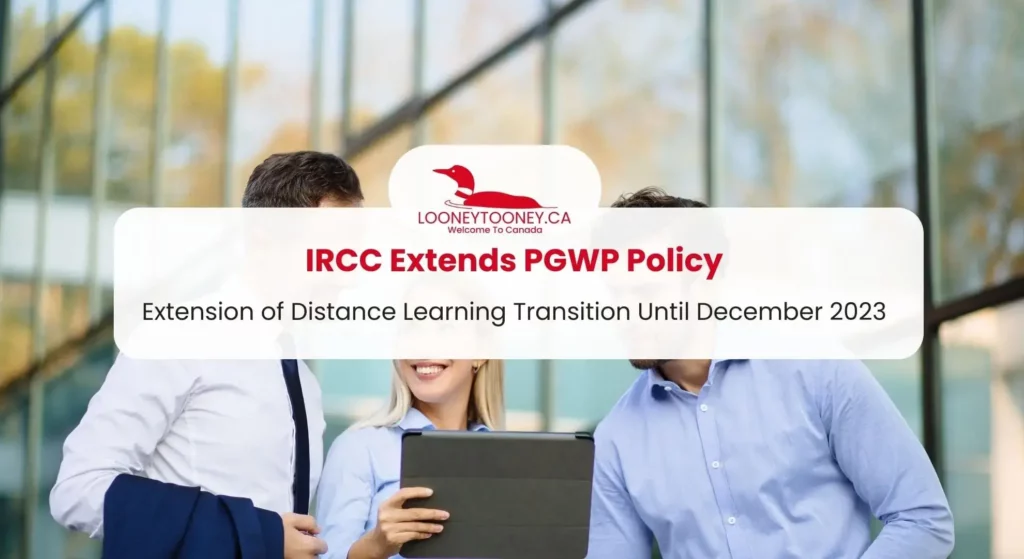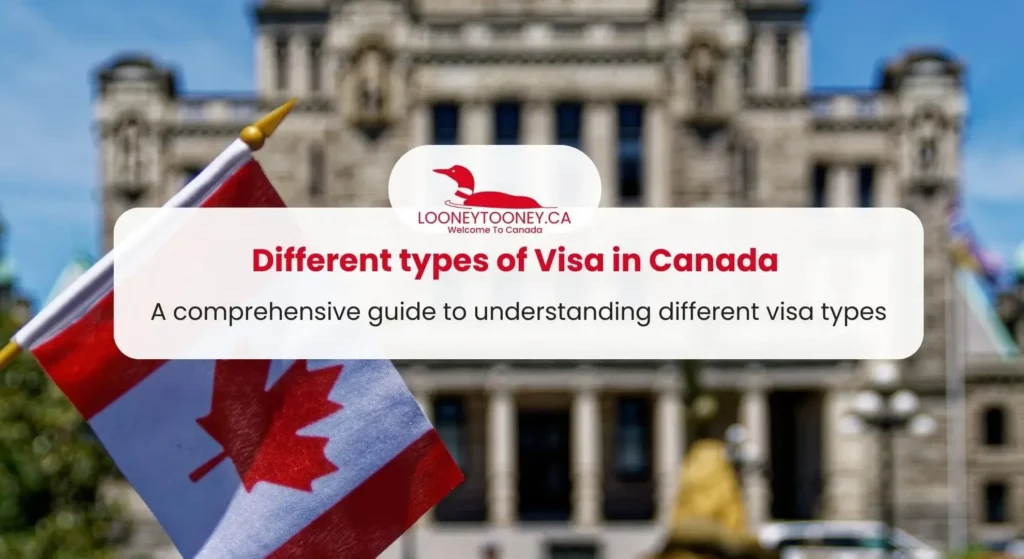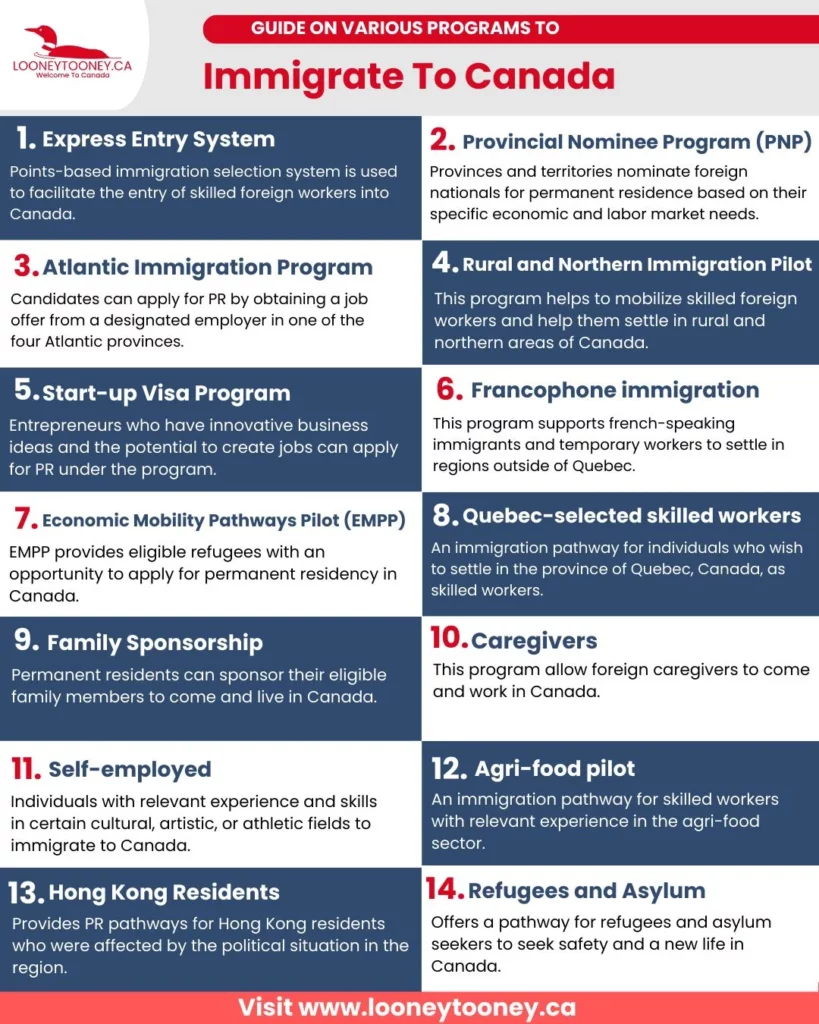On September 1, 2023, Immigration, Refugees, and Citizenship Canada (IRCC) made a significant extension to its temporary public policy, bringing vital updates to the Post Graduation Work Permit (PGWP) program. This extension is a response to the ongoing challenges posed by the COVID-19 pandemic and aims to provide further support to international students. The key feature of this update is the extension of reduced facilitation measures that allow distance learning to count toward PGWP eligibility. In this article, we will delve into the details of policy changes for PGWP and its implications for international students looking to work in Canada after their studies.
Changes to PGWP Eligibility
Given the significant impact of COVID-19 on international students and the higher education sector, temporary changes were implemented regarding the eligibility criteria for Post Graduation Work Permits (PGWPs) for the following categories of students:
- Students who were already enrolled in programs eligible for PGWPs in March 2020.
- Students who commenced PGWP-eligible programs between March 2020 and August 31, 2022.
These temporary policy modifications for the Post Graduation Work Permit Program (PGWPP) aim to streamline the issuance of open work permits for individuals who were either former or current PGWP holders. To qualify for these temporary policy adjustments, referred to as “full facilitation measures” for the PGWPP, these students must meet one of the following conditions:
- Possess a valid study permit.
- Have received approval for a study permit.
- Submitted a study permit application before commencing their program, which was subsequently approved.
Evolving Post Graduation Work Permit Policies
The temporary policy adjustments, referred to as “full facilitation measures,” are not applicable to students who registered in programs after August 31, 2022.
Instead, a new set of temporary policy changes, termed “reduced facilitation measures,” will be operational from September 1, 2022, to December 31, 2023. These measures pertain to students who either commenced or will commence PGWP-eligible programs during this specified period.
Distance Learning Changes
Under typical circumstances, any distance learning courses that a student undertakes outside Canada are not considered when calculating the Post Graduation Work Permit duration. In the regular scenario, students are required to complete 50% of their courses in Canada, in person.
However, temporary policy adjustments have been introduced to accommodate eligible international students who have engaged in distance learning outside Canada.
Full Facilitation Measures
For students who were already enrolled in PGWP-eligible programs in March 2020 or those who began their programs between March 2020 and August 31, 2022, a significant adjustment has been made. These students can now complete up to 100% of their program online from outside Canada. This allowance remains in effect until December 31, 2023, and the time spent studying outside Canada contributes to the overall length of the PGWP.
Reduced Facilitation Measures
Students who have commenced or will commence their program of study between September 1, 2022, and December 31, 2023, must ensure that they complete a minimum of 50% of their program(s) of study within Canada.
Regarding this specific group of students, until December 31, 2023, any time dedicated to studying outside of Canada will be factored into the total duration of the Post Graduation Work Permit only if it represents less than 50% of the program.
Distance Learning Within Canada
In cases where a student’s courses were shifted to an online format in Canada as a response to the pandemic, any duration spent studying online in Canada until December 31, 2023, will continue to be considered when calculating the duration of the Post Graduation Work Permit. It is worth noting, however, that students are strongly encouraged to take advantage of in-class learning opportunities when they are made available.
The temporary policy changes for students in Canada who are engaged in online learning will end on December 31, 2023.
Program Stacking
Until December 31, 2023, eligible students who successfully complete two qualifying programs of study, provided that both programs were either ongoing in March 2020 or initiated between March 2020 and August 31, 2022, may have the opportunity to:
- finish 100% of both programs remotely from outside of Canada (given that both programs were either in progress in March 2020 or commenced between March 2020 and August 31, 2022).
- aggregate the duration of their programs of study when they apply for a Post Graduation Work Permit in the future.
According to the current guidelines for determining PGWP duration, both programs must meet the following criteria:
- Each program must have a minimum duration of 8 months.
- Both programs must be completed at an eligible Designated Learning Institution (DLI) within a span of 2 years.
It’s important to note that students who started their second program on or after September 1, 2022, are required to complete at least 50% of their second program within Canada. They are not eligible for the aforementioned facilitation measure, even if their first program was either ongoing in March 2020 or started between March 2020 and August 31, 2022.
Please be aware that for students enrolled in vocational programs in Quebec, the Diploma of Vocational Studies (DVS) program must have a duration of at least 900 hours to qualify for the facilitation measure. However, an attestation of vocational specialization (AVS) program can have a duration of less than 900 hours when submitted in combination with the DVS program.
Part-Time Status
Students, in Canada or abroad, may have had to pause or become part-time learners due to course cancellations stemming from DLI public health measures. Specifically, for the winter, spring, and summer semesters of 2020 (January 1, 2020, to August 31, 2020), if a student’s status shifted from full-time to part-time due to DLI course delivery changes, their PGWP eligibility remains unaffected.
Quebec Applicants
Foreign students in Quebec need not possess a valid Quebec Acceptance Certificate (CAQ) when applying for a PGWP. As the PGWP is an open work permit and exempt from a Labour Market Impact Assessment (LMIA), neither a CAQ nor a study permit is necessary when obtaining the PGWP.
Expired study permit holders applying for a PGWP can restore their student status without a CAQ and simultaneously apply for the PGWP; the CAQ is not required for the PGWP application.
Work Authorization After PGWP Application
As per paragraph 186(w) of the Immigration and Refugee Protection Regulations, graduates who submit a work permit application, such as a PGWP, prior to the expiration of their study permit are entitled to work full-time without needing a separate work permit while their application is under consideration. However, to qualify for this, you need to meet these conditions:
- Possess a valid study permit at the time of the PGWP application.
- Successfully completed a program of study that qualifies for the PGWP.
- Fulfill the requirements for working off campus without a work permit as outlined in paragraph R186(v).
- Have not exceeded the permissible hours of work specified in paragraph R186(v).
The student must have been enrolled full-time in a program at a DLI, and this program should have lasted for at least 8 months and resulted in a degree, diploma, or certificate.
Concluding PGWP Policy Updates
The recent updates to Canada’s Post Graduation Work Permit Program represent a significant step in supporting international students during the challenges posed by the COVID-19 pandemic. These changes offer increased flexibility in completing studies and applying for work permits, making it easier for eligible students to transition into the Canadian workforce. These changes reflect Canada’s commitment to fostering a welcoming environment for international students and skilled professionals.
To stay updated on the latest IRCC news and Canada Immigration updates, keep in touch with LooneyTooney.ca.
You may also be interested in:





